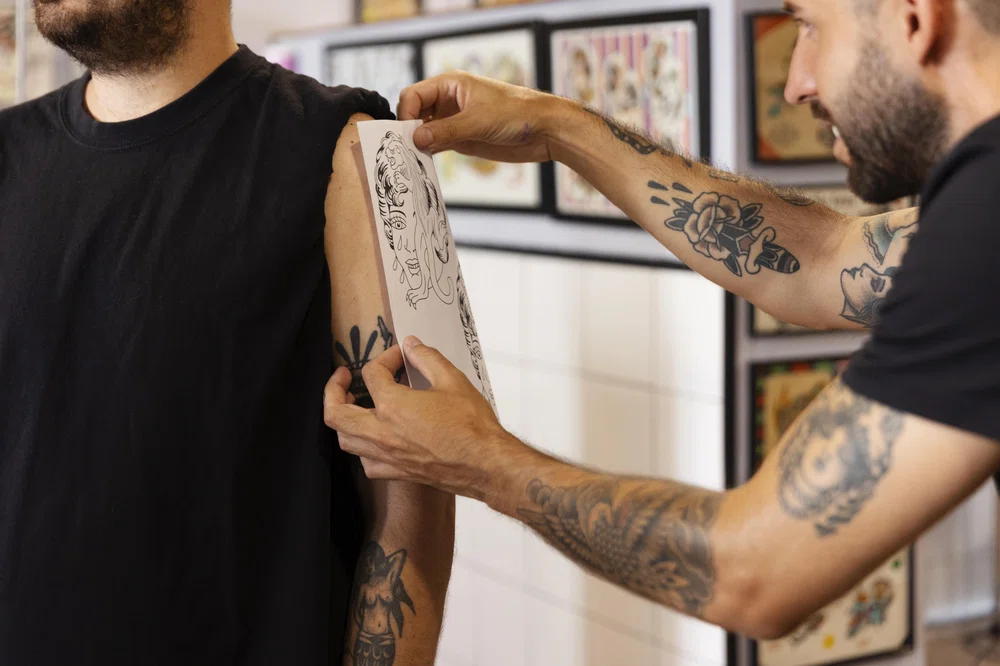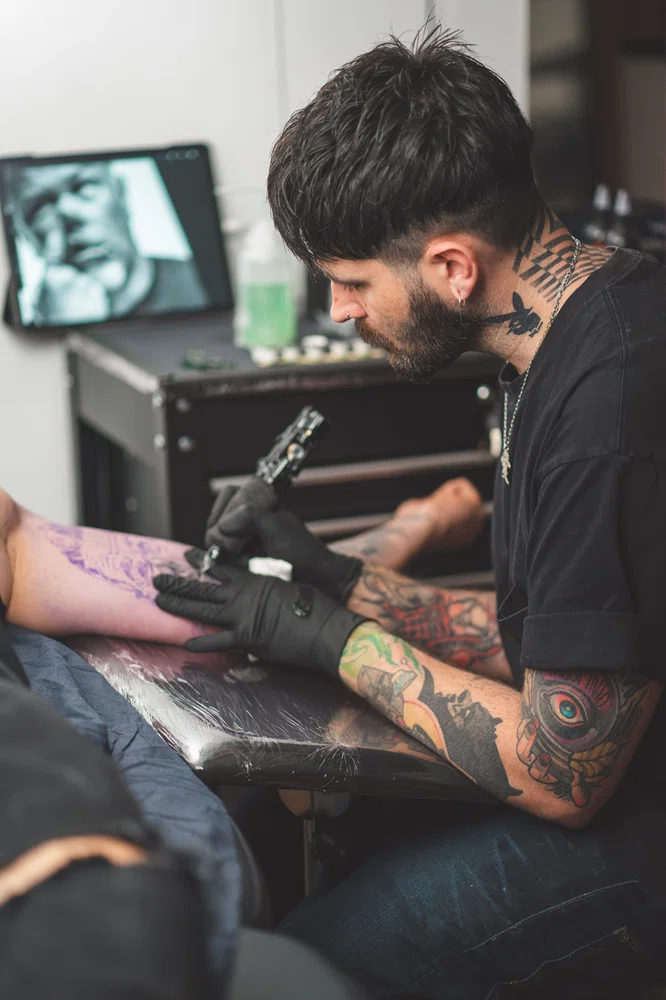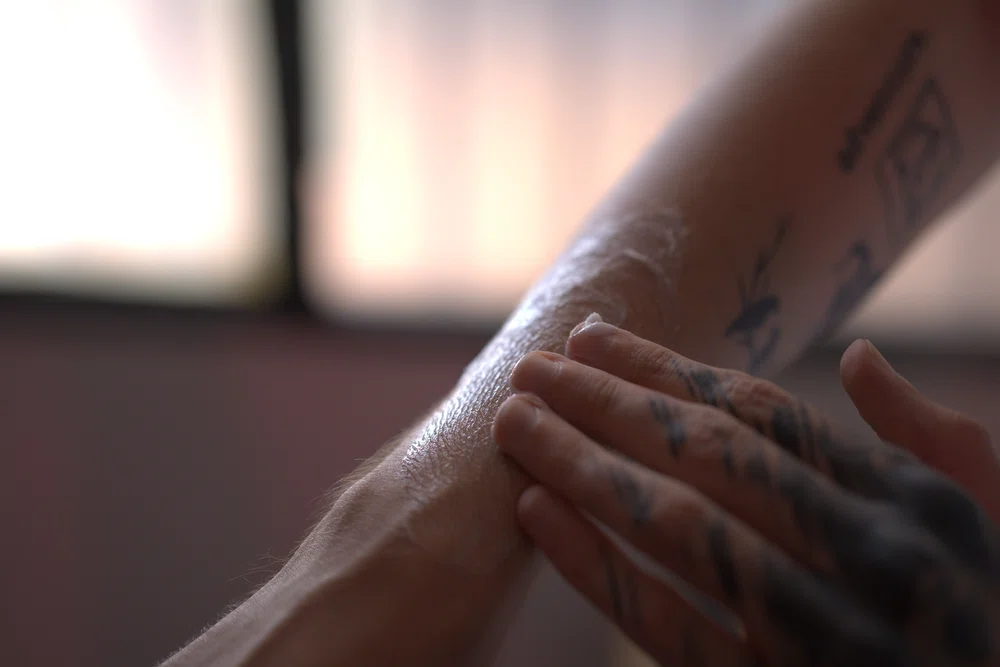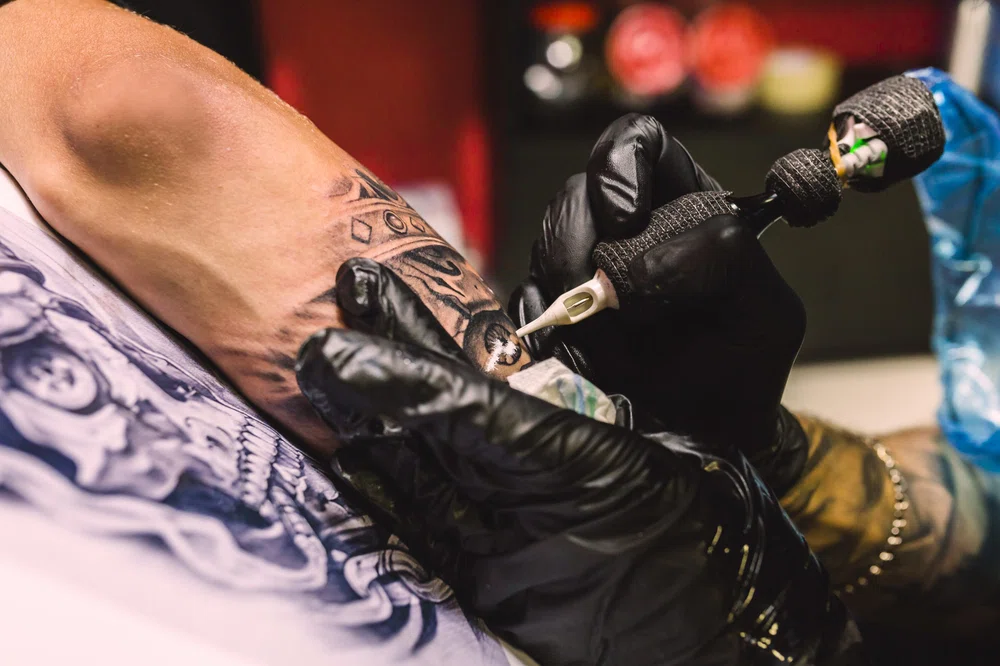Questions that clients fear to ask tattoo artists
And how to answer them by being a good professional tattooist
03 October 2023
Building a reliable relationship with your client is essential for the work to flow in the best possible way. In the world of tattooing, trust is everything, but how to foster it?
As with any relationship in life, communication is key, it's what enables you and your client to create that bond of complicity so that you both feel comfortable...
Which should begin with a couple of questions.But sometimes clients are reluctant to ask crucial questions, either out of embarrassment or ignorance.
So, that is why today we bring you a list of tips for you to know how to answer your clients in order to make them feel safe and comfortable when having a tattoo with you.
What tattoo clients frequently ask
1- “How much does the tattoo cost?”
Certainly, this may be one of the most common questions yet most controversial around. Prices are never fixed as they are always tied to different matters such as design, styles, number of colors, sizes, types of supplies needed, and such.
To better guide your client, rather ask "What do you wish to have and in what size?". This gives you more precise clues as to what they are looking for while helping you get more specific information to determine a more accurate budget.

It is very likely that when talking about sizes, people answer things like "Not too small but not so big"... What size is that, really ?
Before losing your temper, try to chat a little more with the client so that they give you a more detailed answer and explain to them why this is one of the main determining factors regarding the price.
2- “How long will the session take?”
Either way, many factors influence this, but once you've come to a more approximate agreement on what the tattoo should look like, you can have a better idea of how long it will take you.
That's why, when asked this, you can answer that it is relative and that you need to know more about what they want to have before getting to it.
3- “I really love this design, but would like to make a little tweak”.
If you've been tattooing for a while now, you're probably familiar with this question. The reality is that many tattooists end up agreeing to make the extra work but without charging it, which ideally should not happen…
It's as if you went to a store for a pair of jeans and asked the seller to make you a new pair of tailored jeans. At the very least, you should pay something extra, right?
Well, the same happens with your work, the designs you exhibit cost what they are worth. If a client wants to have something "similar", you should make it clear that it's a new, different design and, therefore, it should be charged as such.
We are aware that in many cases it's difficult to achieve this, but make the effort to let others respect your time and dedication.

4- “Where does a tattoo hurt more?”
This question is more frequent among clients who have never been tattooed or who have had few tattoos, due to fear of pain. That's why some are more prone to choose the place where "it hurts the least".
But although tattoos hurt more on certain body areas, each person is unique and the pain threshold may vary. Some people feel nothing at all and others go through a living hell.
So, you can answer this question by indicating the areas where there is less musculature, such as the hands and feet, or in places where the skin is more delicate and sensitive, such as the armpits and groin.
5- “How to take care of my new tattoo?”
As we pointed out in the article How to take care of a tattoo, there are many safe ways to deal with the healing process. You should always keep in mind that each skin is different and that the same process can have different reactions depending on each person.
That's why it is important to educate yourself in order to provide the best care instructions and to follow up on the healing process to rule out possible infections, among other complications.

6- “Would you mind if I bring someone to the session?”
Best case scenario, the client asks you beforehand. But in the worst —and unfortunately more frequent cases— they come accompanied without even asking and not only with a single person but sometimes even with the whole gang...
That's when we face a major problem because, first, nobody needs so much support to get a tattoo and, second (yet most important), it can hinder your job because you need full concentration that can't be guaranteed with so many distractions around.
Before arranging the session, don't hesitate to explain your terms and conditions to your client and explain why it is so necessary to respect your workspace. Not just because you feel like it, but because any mistakes you make will directly affect their tattoo.
Plus, this is highly risky as hygiene gets compromised by breaking sterilization fields, which is something that should be talked about more often. The more people present, the more germs and bacteria hang around, which can lead to infections if ignoring the right precautions.
So, if you are a client and you are reading this, please don't go with your whole pack of friends. Always consult beforehand.
What clients don’t dare to ask
However, there are questions that clients don't usually ask, either out of embarrassment or ignorance, which are key to getting the job done. And some of them may have to do with certain myths or rumors that surround tattooing.
Let’s delve deeper.
1- “What studies and experience do you have?”
As strange as it may seem, many people are reluctant to ask about your training yet still worry about it. While we know that what makes you an expert is practice, learning from professionals gives you great confidence, not only for yourself when working, but also for your client.
That's why we recommend that if you have attended seminars with respectable people and learned in professional training courses, you hang up the certificates in your studio to make sure that the information is reachable.
Nerves and insecurities are absolutely normal and reasonable, so you have to reassure your client above everything else.
2- “How do you guarantee hygiene and safety?”
Many clients hesitate to ask about hygiene procedures, when it's actually something that should always be brought up. Working on someone else's body is a delicate matter that needs to be taken seriously. So, letting them know about all the safety and hygiene in tattooing can help them be sure about you respecting their health.

Maybe there's no need to explain absolutely everything, but you do must sterilize your workstation with the client present so that there is no doubt about all the steps.
3- “Is there an allergy risk?”
Although they may not tell you, many clients have the idea that tattoos cause allergies and this generates fear. Some people dare to ask and others do not.
First of all, you must know that there are some inks that may be more prone to allergic reactions, such as in the case of tattoos with red pigment.
That's why you should ask your client if they have any skin complications and it would be better if you carried out an allergy test to clear up any doubts. Remember to always recommend a medical consultation, there is no one better qualified than a specialist to deal with this delicate issue.
4- “Do tattoos eventually fade?”
This is one of the biggest doubts and, in many cases, a big myth. Whether a tattoo will fade depends on many factors, such as:
- The depth of the needle when tattooing. If you go too shallow, the tattoo will probably not settle properly and eventually fade over time.
- The color of the ink. Lighter inks such as white are usually harder to get into the skin. This is because the natural pigment of the skin tends to overtake these pigments, which may make them lose their presence until disappear.
- The style. Some tattoo styles are more prone to fade or are less resistant to the test of time, such as a FineLine tattoos or the so-called Micro tattoos.
Nevertheless, there are other factors that can interfere with the durability of the tattoo, such as:
- neglecting the sun;
- a bad healing process;
- poor pigmentation;
- poor quality inks, and such.
Whether the client dares to ask or not, you should always explain the aftercare as clearly as possible. And, of course, have a skillfully executed tattooing technique to ensure the durability of your work.
If you wish to develop your skills and learn many techniques to achieve long-lasting effects, take a look at our comprehensive tattoo courses where we share all our experience to guide you on your professional path.
5- “Is it true that white ink hurts more?”
Some people believe that white ink alone has an ability to make it hurt more than others.
But this is an indisputable myth because what actually happens in the majority of cases is that the highlights are applied at the end of the session when the skin is more irritated and sore; which leads to confusion about white ink being painful, when it is actually the natural exhaustion of the skin that produces it.

6- “Do you include touch-ups?”
Many clients don't consult this and, unfortunately, in many cases take for granted that you should retouch the tattoo under any circumstances, which is not always the case.
You can rework a tattoo without charging for the session when you have messed up and made a mistake the first time, but if the reasons are different and the responsibility is the client's, you must set boundaries.
To avoid inconveniences, before booking the session, talk about this and make absolutely everything clear. Need to know more about this controversial subject? Click here to learn when to retouch a tattoo and when not to.
7- “Do you have cancellation or rescheduling policies?”
Again, best case scenario would be that every client asked you this, but it's not usually like this. So, it is up to you to anticipate this situation.
One of the keys to having control over your business is to keep an organized and clear agenda, where you can note down all your appointments and leave some days free in case of cancellations.
Besides, many tattooists ask for a deposit to schedule an appointment, which is a must-have tool because it prevents the client from taking liberties and repeatedly cancelling or bailing on you at the last minute.
This way, you guarantee not to lose your work or time that could have been seized for someone else.
What you must not do as a tattooist
Sometimes the boundaries in the tattooist-client relationship are not clear and while it is true that many clients overstep the limits on some issues, many tattooists do as well.
That's why it is important that during your intake conversation, you respect the other person and don't ask inappropriate questions such as:
“Do you have any medical or mental condition?”
As good as intentions may surround this question, to find out if the client is, for example, epileptic or has a skin condition that may affect the tattoo… you can never know how the other person may take it.
In these situations, it is rather the client's responsibility to let you know, as you cannot guess it nor have to know it beforehand.
But as this question could be misinterpreted, it's best to always keep your distance and in case of asking, do it with the utmost respect so as not to be invasive or intrusive to the other person.
“Why have you chosen this design?”
Many tattoo artists ask about this and the reality is that it doesn't make any difference to you, for example, if a butterfly represents resilience in a personal situation. Your part is to tattoo it, not understand it.
If opening up to you and telling you about it comes naturally from your client, then great! But you never know how personal or intimate a tattoo might be, so it's best to avoid asking.
We may sound harsh or cold by saying this, but the bottom line is that it doesn't matter whether the design has a meaning behind it or not. What truly matters the most is that you perform it the best you can, with all the talent you can deliver.
So, unless the client initiates sharing something personal about it, just stick to doing your job and respect their inner issues.
We hope this note has helped you to orient yourself on how to best respond to your clients' concerns.
If you're eager to know more, feel free to DM us on Instagram; you can find us as @10masters. And remember that you can also train with us to become a professional tattoo artist.